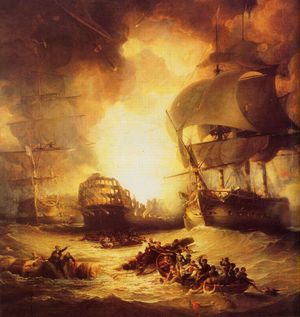June 22, 2006
Gratuitous Wodehouse/Royal Navy Geek Posting

Regular readers of Plum Wodehouse will recollect that on appropriate occasions, Bertie Wooster will trot out a reference to the boy who stood on the burning deck whence all but he had fled.
This is the first line of the poem "Casabianca" by Felicia Hemens (1793-1835):
The boy stood on the burning deck
Whence all but he had fled;
The flame that lit the battle's wreck
Shone round him o'er the dead.
Yet beautiful and bright he stood,
As born to rule the storm;
A creature of heroic blood,
A proud, though child-like form.The flames rolled on–he would not go
Without his Father's word;
That father, faint in death below,
His voice no longer heard.He called aloud–'say, Father, say
If yet my task is done?'
He knew not that the chieftain lay
Unconscious of his son.'Speak, father!' once again he cried,
'If I may yet be gone!'
And but the booming shots replied,
And fast the flames rolled on.Upon his brow he felt their breath,
And in his waving hair,
And looked from that lone post of death
In still yet brave despair.And shouted but once more aloud,
'My father! must I stay?'
While o'er him fast, through sail and shroud,
The wreathing fires made way.They wrapt the ship in splendour wild,
They caught the flag on high,
And streamed above the gallant child,
Like banners in the sky.There came a burst of thunder sound–
The boy–oh! where was he?
Ask of the winds that far around
With fragments strewed the sea!–With mast, and helm, and pennon fair,
That well had borne their part–
But the noblest thing which perished there
Was that young faithful heart.
Just the sort of thing an Edwardian boy would be expected to memorize (and no doubt be compelled to recite in the drawing room for the amusement of his parents' visitors).
Now what I did not know is that the poem is actually a reference to the Battle of Aboukir Bay (aka the Battle of the Nile), fought August 1-2, 1798, in which Admiral Horatio Nelson utterly destroyed the French fleet supporting Napoleon's invasion of Egypt.
The French flagship was L'Orient of 120 guns, under the command of Admiral Paul D'Brueys. His flag captain, in charge of L'Orient herself, was Captain Casabianca whose son accompanied him on the expedition.
L'Orient was attacked by no fewer than three British ships of the line, Bellerophon, Alexander and Swiftsure. While she got the better of Bellerophon, in her subsequent pounding by the other two British ships, a fire broke out aboard L'Orient. By this time, both Brueys and Casabianca were dead. The legend, which sparked the poem, was that Casabianca's son refused to leave his father's body. The fire gradually spread and at around ten o'clock in the evening, reached L'Orient's powder magazine. The ship blew apart like a gigantic bomb, sending enormous chunks of debris flying in every direction. Firing all along the line ceased for a time in pure awe and horror at the spectacle.
I learned the tidbit about the connection between Hemens' poem and the fate of L'Orient while reading David Cordingly's The Billy Ruffian: The Bellerophon and the Downfall of Napoleon. And curiously enough, I read about it just as I was grumbling to myself about the book. Don't mistunderstand - it's a very good primer from the ordinary layman's perspective. But I've read so much about Nelson's navy in the past few years that I'm reaching the point where this kind of popular treatment is beginning to, well, bore me a bit and I need to move on to more advanced, specialized works. (That sounds reyther thnobbish, I know, but it's true nonetheless.)
On the other hand, this whole post just goes to show the danger of being too dismissive of the simpler sources of information.
One never knows, what?
Posted by Robert at June 22, 2006 09:15 AM | TrackBackThe boy stood on the burning deck
Eating peanuts by the peck...
Thanks for posting the poem in its entirety. They reference it in "Dracula" as well, but I never heard the full backstory of the poem before.
Posted by: dillene at June 22, 2006 03:48 PMThere is a reference in "Little Women" to Beth, I believe, making a "Casabianca" of herself. I never remembered to look it up. So thanks for that clarification.
The poem also strikes me as something a good friend's dad would make a stunning recitation of!
Thanks again.
Posted by: keysunset at June 22, 2006 09:54 PM

 Image courtesy of the lovely and talented
Image courtesy of the lovely and talented 